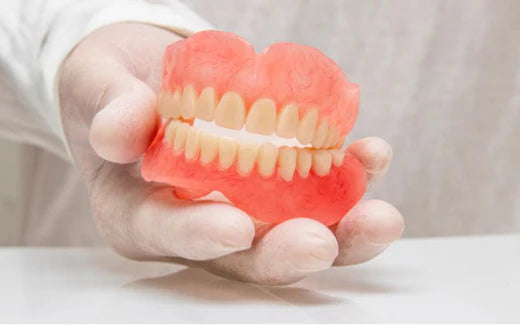
Can I Clean My Dentures With Bleach?
Dentures are a common oral appliance and a daily essential for many people, allowing them to speak and eat, as well as smile confidently. Just like any other oral appliance and natural teeth, dentures need regular cleaning. But what is the best way to clean them? Can I clean my dentures with bleach? If you’re wondering whether you can clean your dentures with bleach, keep reading, in this blog post we’ve got all the answers.
Why is it Important to Clean Your Dentures?
Cleaning your dentures is important for maintaining good oral hygiene and overall good health and well-being. Food and debris can get stuck in your dentures, just like natural teeth, so they need to be regularly cleaned to protect the rest of your mouth from encountering any issues such as gum disease, bad breath or an oral infection due to the build-up of bacteria. Research has shown that the longer a dental appliance remains in the mouth without proper cleaning, the more bacteria that is present. Therefore if you wear your dentures throughout the day, you need to clean them regularly to keep this bacteria and any plaque build-up at bay.
It is also important to clean your dentures to extend their lifespan and prevent them from becoming damaged.
Do All Types of Dentures Need Cleaning?
Yes, all types of dentures require regular cleaning to ensure they are kept in tip-top condition and your oral health optimal. No matter if you have full or partial dentures, they need to be properly cleaned to remove plaque, bacteria, and food particles.
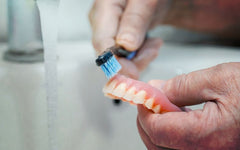
What Happens if I Don’t Clean My Dentures Regularly?
If you don’t clean your dentures regularly you could shorten the lifespan of your dentures, meaning they may need to be replaced more often. More importantly, you are likely to accumulate a lot of bacteria in your mouth that can lead to gum disease and cavities, bad breath and other oral infections.
One study found that dentures can act as a reservoir for potential respiratory pathogens and bacteria, with 64.6% of the tested dentures being colonized by known respiratory pathogens. They concluded that routine denture hygiene practices, like cleaning dentures, could help to reduce the risk of respiratory infection.
How Often Should You Clean Dentures?
It’s recommended that you clean your dentures after each wear or once per day. Many people remove their dentures before they go to sleep, making it the perfect time to give them a clean.
Using Bleach to Clean Dentures
If you’re thinking about using bleach to clean your dentures, we must first say that it is not recommended and many dentists will tell you to avoid any bleach-based products when cleaning your dentures. This is because it can cause damage to your dentures as well as your health.
Bleach, also known as sodium hypochlorite, is a common household cleaning product, known for disinfecting, killing bacteria and removing stains. It is therefore understandable that you may be considering bleach to clean your dentures, but here are the reasons not to.
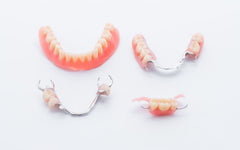
The Risks of Using Bleach on Dentures
Irritation
Bleach is a very harsh chemical that can irritate your skin, especially the inside of your mouth and gums. Exposing your dentures to bleach could therefore cause pain, inflammation and discomfort to your mouth when and after wearing them.
Damage to Dentures
Bleach is corrosive and cleaning your dentures with bleach will damage them by weakening their structure, altering how they fit in your mouth. Their materials may also start to disintegrate and discoloration may also occur, all of which shortens the lifespan of your dentures. The average lifespan of dentures is 5-10 years and can cost anywhere from $600 to $15,000, so it’s well worth looking after your dentures and giving them a long life.
Toxic
Ingesting bleach or inhaling its fumes is toxic and harmful to your health. Therefore dentures cleaned in bleach and then worn can be extremely dangerous and could lead to vomiting, respiratory problems or other adverse health issues.
Discolouring
Bleach can be effective at removing stains, but using it holds the risk of discoloring your entire denture, especially if they are made from certain materials particularly susceptible to bleaching. Dentures are designed to look as natural as possible, but using bleach could cause them to look unnatural when you wear them and can even cause yellowing or a dull appearance, which could impact your overall confidence.
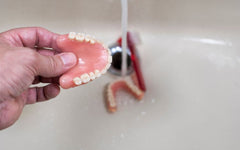
Alternative Ways to Clean Dentures
Instead of using bleach to clean dentures, discover other alternative ways to keep your dentures clean and sparkling.
Soak & Brush
Soaking dentures in proper denture cleaning solution and brushing them with a soft brush is a more traditional way of cleaning your dentures. It’s always recommended not to use hot water to clean dentures to avoid damaging them and to always clean them over a towel in case you drop them as this will stop them breaking.
Ultrasonic Cleaning Machine
Ultrasonic cleaning is an effective method of removing bacteria with minimum effort. A completely safe and toxic-free alternative to bleach, ultrasonic cleaning machines use high-frequency sound waves to create microscopic bubbles that knock against the denture or oral appliance to dislodge debris, stains and bacteria, leaving dentures sparkling clean without using any harsh chemicals.
The Dental Pod is a great ultrasonic cleaning machine recommended by leading dentists. Combined with the DentalPod Sterilizing Tablets, it can kill 99.9% of bacteria on dentures with absolutely no damage to the appliance, all in under 5 minutes.
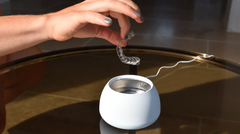
The Benefits of Ultrasonic Cleaning vs Bleach
There are many benefits of using an ultrasonic cleaning machine, like the Dental Pod, over bleach, such as:
Deep Cleaning
The Dental Pod can target hard to reach areas that bleach or other traditional cleaning methods like brushing can’t achieve. Ultrasonic cleaning is highly effective in removing plaque, tartar and bacteria with minimal effort!
Time-Saving
As mentioned, using an ultrasonic cleaning machine is a fast and effective way of cleaning dentures. There's no need to leave dentures soaking overnight or spend time cleaning them with a brush. Simply put them in the ultrasonic cleaner and turn it on.
Safe & Non-Toxic
Unlike bleach, ultrasonic cleaners are safe to use, don’t require chemicals and are non-toxic. Safe for you and safe for the environment they allow for better cleaning, better oral health and less chemical waste.
Gentle
Bleach is often abrasive and will damage the materials of your denture. However, an ultrasonic cleaner is gentle on dentures and other oral appliances and won’t cause any warping, discoloration or damage, even when used regularly.

Choose the Dental Pod for Cleaning Dentures
If you’re looking for the most effective, efficient and safe way to clean your dentures, choose the Dental Pod by Zima Dental. A worthwhile investment into your oral health and the lifespan of your dentures, never brush your oral appliances again as you let the ultrasonic cleaner do all the work, completely chemical-free.
If you have any questions or want to find out more, the Zima Dental team is always happy to help. Contact us by clicking here.
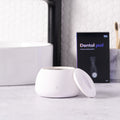
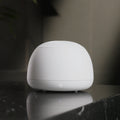
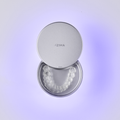

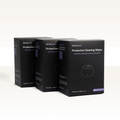

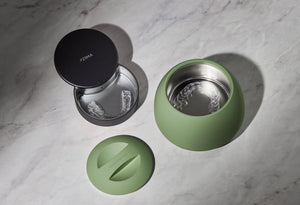
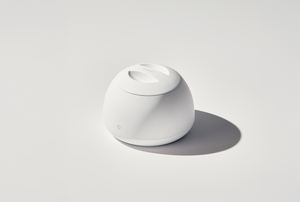
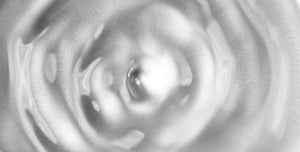
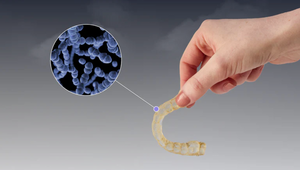
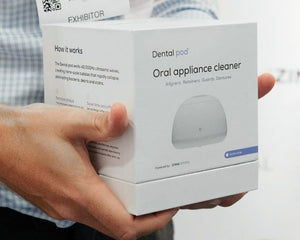




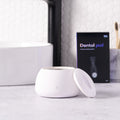
Leave a Comment